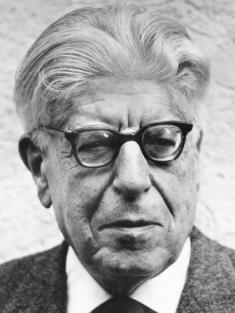Ernst Bloch (Ernst Bloch)

Ernst Bloch was born in Ludwigshafen, the son of a Jewish railway-employee. After studying philosophy, he married Else von Stritzky, daughter of a Baltic brewer in 1913, who died in 1921. His second marriage with Linda Oppenheimer lasted only a few years. His third wife was Karola Piotrowska, a Polish architect, whom he married in 1934 in Vienna. When the Nazis came to power, they had to flee, first into Switzerland, then to Austria, France, Czechoslovakia, and finally the United States. Bloch returned to the GDR in 1949 and obtained a chair in philosophy at Leipzig. In 1948 Ernst Bloch was offered the chair of philosophy at the University of Leipzig. In 1955 he was awarded the National Prize of the GDR. In addition, he became a member of the German Academy of Sciences at Berlin (AdW). He had more or less become the political philosopher of the GDR. Among his many academic students from this period was his assistant Manfred Buhr, who earned his doctorate with him in 1957, and was later professor in Greifswald, then director of the Central Institute of Philosophy of the Academy of Sciences (ADC) in Berlin and who become a critic of Bloch. But the Hungarian uprising in 1956 brought the convinced Marxist Bloch to reverse course for the SED regime. Because he taught his humanistic ideas of freedom, he was retired in 1957 for political reasons – not because of his age, 72 years. A number of scientists and students spoke publicly against this forced retirement, among them the renowned professor and colleague Emil Fuchs and his students as well as Fuchs’s grandson Klaus Fuchs-Kittowski.
When the Berlin Wall was built in 1961, he did not return to the GDR, but went to Tübingen in West Germany, where he received an honorary chair in Philosophy. Bloch’s The Principle of Hope was written during his emigration in the United States, where he lived briefly in New Hampshire before settling in Cambridge, Massachusetts. He wrote the lengthy three volume work in the reading room of Harvard’s Widener Library. Bloch originally planned to publish it there under the title Dreams of a Better Life. The Principle of Hope tries to provide an encyclopedic account of mankind’s and nature’s orientation towards a socially and technologically improved future. He died in Tübingen.
Born
- July, 08, 1885
- Ludwigshafen, Germany
Died
- August, 04, 1977
- Tübingen, Germany
Cemetery
- Bergfriedhof Tübingen
- Tübingen, Germany



